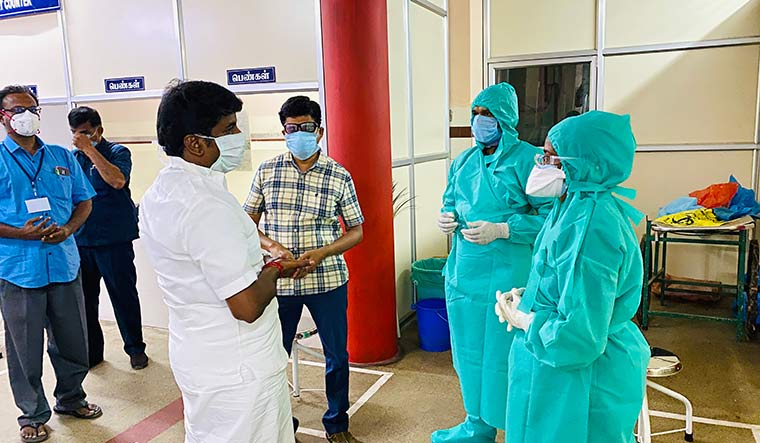IN RECENT DAYS, Health Minister C. Vijayabaskar and his team have been hailed as the saviours of Tamil Nadu. The state has, in the past six months, done the most testing—nearly 80,000 every day since August 29. It has also been locked down the most. While the growth rate of cases has plateaued in the past few weeks, the number of deaths—7,322—is still worrying.
The state’s battle against the virus took a turn in mid-April, when J. Radhakrishnan replaced Beela Rajesh as health secretary. The former has experience in handling disasters, and he was immediately faced with one. The Koyambedu wholesale market in Chennai became a hotspot, and the city began recording more than 2,000 cases daily. “This is when we decided to go for door-to-door screening,” Vijayabaskar told THE WEEK. The health department set up fever camps in every ward of Chennai. About five months later, the Greater Chennai Corporation has nearly 190 fever camps in the city. Any person can walk in and get tested. The result of the RT-PCR test, which took three days in April, takes six to 12 hours now. “This is because we have government-run testing centres in every district,” said Vijayabaskar.
There are 150 approved testing centres across the state; 87 of these are private. The government bears the cost of testing there, too. The state spends 07 crore every day on testing, said Vijayabaskar.
When a person tests positive for the virus, the authorities call him and dispatch an ambulance. A bed is allotted, based on availability, before he reaches the hospital. A pack of medicines, which includes vitamin and zinc tablets, is kept ready for the patient. A blood test and a CT scan are done, based on which the medicine dosage is decided. “We give remdesivir and tocilizumab based on requirement,” said Vijayabaskar. “Earlier, we did not have ample stock of these drugs. But now we are self-sufficient.”
Also read
- Covid: Two-day nationwide mock drill to assess preparedness from today
- AIIMS to perform only urgent surgeries from Saturday as COVID cases spike
- HC asks Delhi Govt why it didn't 'wake up' when COVID-19 numbers were spiraling
- Governments need to avoid imposing arbitrary lockdowns
- Metros vs microbe
- Newer targets
Testing apart, the minister explained how the government handled Covid-19 clusters. The Koyambedu market aside, there was focus on micro-clusters, particularly in crowded slums. “We set up toilets within containment zones,” he said. “We ensured people got everything, so that they do not come out. Food supply to every household in the micro-clusters was ensured.”
But now, as the city reopens, the health system would have to be wary. “I do not know if there will be rapid spread, but we are well prepared to handle it,” said Vijayabaskar. He added that the health infrastructure, which has been scaled up by 30 per cent, will be expanded to 50 per cent in the next two weeks.
At the Rajiv Gandhi Government General Hospital in Chennai, for instance, there are 2,000 beds exclusively for Covid-19 patients; the number was 50 in March. “We ensure that 30 per cent of the beds are available to accommodate new patients,” said Dr T.S. Selvavinayagam, director of public health. “So, when the hospital gets 70 per cent filled up, we immediately increase the number of beds by scaling up the infrastructure in every hospital. The lockdown helped us work out strategies to contain the spread and scale up infrastructure.”


